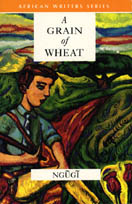Biography

Ngugi wa Thiong’o, a Kenyan writer of Gikuyu descent, began a very successful career writing in English before turning to work almost entirely in his native language, Gikuyu. In his 1986 Decolonising the Mind, his “farewell to English,” Ngugi describes language as a way people have not only of describing the world, but of understanding themselves. For him, English in Africa is a “cultural bomb” that continues a process of erasing memories of pre-colonial cultures and history and as a way of installing the dominance of new, more insidious forms of colonialism. Writing in Gikuyu, then, is Ngugi’s way not only of harkening back to Gikuyu traditions, but also of acknowledging and communicating their present. Ngugi is not only concerned with universality, though models of struggle can always move out and be translated for other cultures, but with preserving the specificity of his individual groups. In a general statement, Ngugi points out that language and culture are inseparable, and that therefore the loss of the former results in the loss of the latter:
[A] specific culture is not transmitted through language in its universality, but in its particularity as the language of a specific community with a specific history. Written literature and orature are the main means by which a particular language transmits the images of the world contained in the culture it carries.Language as communication and as culture are then products of each other. . . . Language carries culture, and culture carries, particularly through orature and literature, the entire body of values by which we perceive ourselves and our place in the world. . . . Language is thus inseparable from ourselves as a community of human beings with a specific form and character, a specific history, a specific relationship to the world. (15-16)
Aside from Decolonising the Mind, Ngugi has written several novels in English: Weep Not, Child, A Grain of Wheat, The River Between, and Petals of Blood, as well as a memoir of the time he spent detained by the Kenyan government, Detained. Other works include his essays, collected in Homecoming, the short story collection, Secret Lives, and the plays The Black Hermit and The Trial of Dedan Kimathi (with Micere Mugo). Since turning to Gikuyu, Ngugi has written the play I Will Marry When I Want (with Ngugi wa Mirii) and the novels Devil on the Cross and Matigari.
See also: Colonial Education
Author: Jennifer Margulis, Spring 1996
Last edited: May 2017
